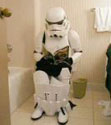|
Okay, I posted my resume a while back, it was a terrible piece of poo poo. I'm hoping this will be a slightly less terrible piece of poo poo. I left out my address intentionally. https://drive.google.com/file/d/0B8jGsS5FuFPIQ0x2LUFkeGk2MnM/view?usp=sharing e: I am thinking, should I put in my surveying jobs (That I'm not really applying to anymore) or should I try to whittle it down to a single page. Or will that be too sparse?
|
|
|
|

|
| # ? May 14, 2024 05:48 |
|
5 months unemployed. How do you know if you're unemployable?
|
|
|
|
Pegged Lamb posted:5 months unemployed. How do you know if you're unemployable? I was out of work for almost 18 months after graduating. Mind you, now my current job's gone to poo poo and I'm having just as little luck finding a new one, but perseverance really does pay off even though it sounds like a shallow bullshit mantra cooked up by people who have never felt the soul-eroding spiral of lifeless self-loathing that is long-term unemployment.
|
|
|
|
Oxxidation posted:I was out of work for almost 18 months after graduating. Mind you, now my current job's gone to poo poo and I'm having just as little luck finding a new one, but perseverance really does pay off even though it sounds like a shallow bullshit mantra cooked up by people who have never felt the soul-eroding spiral of lifeless self-loathing that is long-term unemployment. Hope you're not getting rusty
|
|
|
|
totalnewbie posted:Hope you're not getting rusty I will punch your face in the face
|
|
|
|
I'm not entirely sure where to ask this question but figured this subforum and particular thread were the most appropriate. I just recently graduated with my bachelor's and am throwing my resume out left and right, applying to jobs in my field. Some of these positions ask for my transcript from college which isn't exactly glowing due to a longstanding battle with undiagnosed depression. I am now medicated for the condition and finished my education decently strong, as I'm applying should I be checking "Yes" on the protected disabilities section of job applications? Depression's listed as one of the conditions but it's kept under control by the medication, so I didn't know if the protections still applied to my case. How does checking yes to the disability box change my application review?
|
|
|
|
I'm reworking my application as a senior in school right now, and have a question for you guys. I have quite a bit of work experience and organizations that right I'm listing in a very typical chronological order, with work experience lumped together and then other activities after. After talking to the career services at my university, they recommended that I scrap that and instead list it all together as "Relevant Experience", with chonrology be damned and instead be ordered by importance and relevance to position. For example, I'm currently working a simple campus job, but they recommend that the first thing on my list by my technical internship from the summer before even though it was chronologically prior. Likewise, they recommended that I put an organization that I've had leadership expeirence in after my internship, even though it was neither work experience nor as recent. What do you guys think about scrapping the standard format a bit? On one hand it scares me to go off the beaten path, but on the other hand I totally understand wanting to highlight the most valuable points.
|
|
|
|
Raptor1033 posted:I'm not entirely sure where to ask this question but figured this subforum and particular thread were the most appropriate. Those protections probably don't apply. quote:Although clinical depression is a mental impairment under the ADA, not everyone with clinical depression will qualify for coverage. In 1999, the Supreme Court ruled ( Sutton v. United Airlines, Inc., Murphy v. United Parcel Service, Inc. and Albertson's Inc. v. Kirkinburg) that the determination of whether a person has an ADA "disability" must take into consideration whether the person is substantially limited in performing a major life activity when using a "mitigating measure". This means that even though clinical depression is a permanent condition, if you are able through medications and therapy to perform major life activities without difficulty you will not meet the ADA's definition of "disability." But even if they do, I'm not sure a lot of employers will view your transcript in a better light because you revealed it. Some might, but most will view you as a liability. Legally, if you are a protected class, they can't discriminate against hiring you, provided you can do the job with reasonable accommodations, but in practice it doesn't always work that way.
|
|
|
|
Thanks for the reply and that's pretty much what I expected. I'll continue checking no on that particular question. So when I do submit a transcript when asked, do I do so without comment? Or should I include a short explanation? Along the lines of "I was loving up but you can see where I got my poo poo together." Edit: From the willingness of my professors and internship mentor to be job references, I'm pretty sure I'll get lovely words from them. I expect that would carry quite a bit more weight in any case. hazardousmouse fucked around with this message at 00:49 on Jan 15, 2015 |
|
|
|
How bad is your GPA? If it's under 3, then you probably need to make some sort of general comment in your cover letter about getting your poo poo together and mention you have references available from professors/your internship to vouch for you.
|
|
|
|
2.801, whole lotta As and Bs, very few Cs or Ds. Quite a few Fs from the previous major I hated before I figured out I hated it. Basically if you cut my college career in half I'd have a 3.0+ for my junior and senior years but I have that unfortunate anchor weighing me down. Thanks for the heads up, will modify the cover letter a bit.
|
|
|
|
Quandary posted:I'm reworking my application as a senior in school right now, and have a question for you guys. I have quite a bit of work experience and organizations that right I'm listing in a very typical chronological order, with work experience lumped together and then other activities after. After talking to the career services at my university, they recommended that I scrap that and instead list it all together as "Relevant Experience", with chonrology be damned and instead be ordered by importance and relevance to position. For example, I'm currently working a simple campus job, but they recommend that the first thing on my list by my technical internship from the summer before even though it was chronologically prior. Likewise, they recommended that I put an organization that I've had leadership expeirence in after my internship, even though it was neither work experience nor as recent. You could leave out irrelevant campus jobs because since you're a student having employment gaps from August to May won't send up any red flags, so then all that's left is relevant internships and projects. If it looks too sparse without them I'd do the relevant experience separation. In general people in academia are out of touch with what the job market is actually like so take any advice they give you with a grain of salt. I've had professors tell me to physically mail my resume to prospective employers
|
|
|
|
If you have multiple interviews and offers, how do you choose which one? Especially when you're jobless for a while and tell the first person "yes I can start x day" I don't want to burn bridges, but I have an offer letter coming tomorrow and a hiring manager at another company who said they'd be able to offer me at least as much as I've already agreed to, but I'm only at the phone interview stage. I don't know what I'm doing at all. And I am broke as gently caress. Ugh. This is the first time I've ever felt in demand before and I have no clue why I'm interesting now.
|
|
|
|
Serious Cephalopod posted:If you have multiple interviews and offers, how do you choose which one? Especially when you're jobless for a while and tell the first person "yes I can start x day" My amateur advice would be to pick the job you think you'll enjoy the most. If you don't know which job that is, ask lots of questions during your interviews to get a better idea. I was unemployed for about 6 weeks and took the first job I was offered, and a couple days later two more companies reached out to me to schedule interviews. It made me wish I would have waited before signing the first contract, because 6 months later I'm already looking for another job. Never forget, you're going to spend a lot of time at your job, and regardless of how much you make, you have to enjoy it! (or, at the very least, be able to tolerate it if it means you get paid more)
|
|
|
|
About a month ago I came across a job posting for a position in a field very close to what I did for my graduate degree (MS in Chemistry), with a company who made the instrument I used for that part of my degree. The posting was a couple months old and a little too far away for me, but I figured it wouldn't hurt to apply so I did. A couple days after applying I get a call from the hiring manager who wrote the listing, who said he was preparing to make an offer to another candidate but that he liked my qualifications and told me to keep their company in mind for the future. Today he calls me again to say they've hired someone for the role, but again we really liked your resume and we hope to talk to you again about your qualifications. How much should I read into this? When I was applying for jobs right out of grad school hardly anyone ever contacted me when a position I applied to had been filled by someone else. I think I got one e-mail from a certain position and then the rest of it was me following up with them, no hiring manager ever called me and no one contacted me to "keep in touch" twice. No one's ever come on to me like this in terms of hiring, but is that what's even going on here?
|
|
|
|
C-Euro posted:About a month ago I came across a job posting for a position in a field very close to what I did for my graduate degree (MS in Chemistry), with a company who made the instrument I used for that part of my degree. The posting was a couple months old and a little too far away for me, but I figured it wouldn't hurt to apply so I did. A couple days after applying I get a call from the hiring manager who wrote the listing, who said he was preparing to make an offer to another candidate but that he liked my qualifications and told me to keep their company in mind for the future. Today he calls me again to say they've hired someone for the role, but again we really liked your resume and we hope to talk to you again about your qualifications. He's probably being nice and legitimately would like for you to apply if anything comes up. But if there isn't currently a role for you then this is not anything you can action on. I'd just keep living your life. Let him know that if he sees any suitable opportunities you'd appreciate if he'd let you know, and likewise you'll keep an eye out, but for now good luck. Serious Cephalopod posted:If you have multiple interviews and offers, how do you choose which one? Especially when you're jobless for a while and tell the first person "yes I can start x day" You can try to renegotiate for the first company. Tell them that you're talking with another place which is offering more money but you would love to work at their company, so if they can match/go up to x amount then you'll accept. Go over your qualifications again if it helps present a case. You can try to get more time to consider the offer / speed up the process at the other place. This I'm less fond of. You likely won't get enough time to finish the second process and you'll be presenting a wishy-washy countenance to the guys that actually want you for sure. You could accept the job and then finish the interview process at the other place and if their offer is good enough you can quit the first job. I'm really not fond of this one but if 1) you're talking about some retail job where nobody cares anyway or 2) the money is way way better ... then it's an option. The things you have to consider are: 1) Where are you in your career? Just starting out? Because then money isn't everything. You want to look at job responsibilities, company culture and brand, etc. 2) How sure are you that you can get the second job? How sure are you that if you end up with zero jobs you'd be able to get a job in the near future? If all the other things are better at the second place and you're also fairly sure you can go another couple months unemployed, I'd stick it out. But be like 80% sure. Bicuspid fucked around with this message at 17:33 on Jan 20, 2015 |
|
|
|
C-Euro posted:How much should I read into this? When I was applying for jobs right out of grad school hardly anyone ever contacted me when a position I applied to had been filled by someone else. I think I got one e-mail from a certain position and then the rest of it was me following up with them, no hiring manager ever called me and no one contacted me to "keep in touch" twice. No one's ever come on to me like this in terms of hiring, but is that what's even going on here? Sounds like they have a tough time filling that position and want to stay on as good terms with qualified people who've shown interest.
|
|
|
|
Bicuspid posted:You could accept the job and then finish the interview process at the other place and if their offer is good enough you can quit the first job. I'm really not fond of this one but if 1) you're talking about some retail job where nobody cares anyway or 2) the money is way way better ... then it's an option. We've had a few people do this at my current job. A new hire will join up, then a week or two later they'll be gone, and when we ask around about what happened to have them leave so quickly, someone explains that they heard back from another interview after a longer-than-usual wait and they took that job. Then we usually just hire the 2nd place candidate from the same batch of interviews (and possibly cause them to do the same thing at another job?).
|
|
|
|
RadioPassive posted:We've had a few people do this at my current job. A new hire will join up, then a week or two later they'll be gone, and when we ask around about what happened to have them leave so quickly, someone explains that they heard back from another interview after a longer-than-usual wait and they took that job. Then we usually just hire the 2nd place candidate from the same batch of interviews (and possibly cause them to do the same thing at another job?). Recruiters like to encourage this behaviour too - I had a first stage interview at one company while awaiting the outcome of a second stage interview, then got the offer through from the first one and told the recruiter for the second one that I was taking the first. The recruiter badgered me (quite politely) with emails for a day and a half saying I should go to the other interview, he was sure I was a good fit for it, and I could always tell the first job I'd had a better offer after I started there and just up and quit. I had to be entirely blunt and say "I got the other one, I like the other one, and I don't really like the idea of stringing them along" before he admitted defeat.
|
|
|
|
I think our problem is we typically pay ~20% below average, so if anyone gets another offer, it's for more money. For our entry level positions we just get outbid on starting pay for recent college grads all the time.
|
|
|
|
RadioPassive posted:We've had a few people do this at my current job. A new hire will join up, then a week or two later they'll be gone, and when we ask around about what happened to have them leave so quickly, someone explains that they heard back from another interview after a longer-than-usual wait and they took that job. Then we usually just hire the 2nd place candidate from the same batch of interviews (and possibly cause them to do the same thing at another job?). This happened at my workplace too, except it was 10 months. Hiring can be really, really slow in my field. He was hired to reduce my workload so it was really nice for about 10 months there and now my workload has exploded again. Cherry on top was that my boss told me he can't afford to replace the guy because there are only like 20 guys on the planet who do this job and he can't afford to pay what they'd want. I think that is a bit of an exageration and the company just doesn't have any liquid cash. Anyway, it sucks but I don't blame the guy.
|
|
|
|
So I have a question... I had a HR phone interview that went fine and was scheduled quickly for a phone interview with the hiring manager. On that hiring manager phone call today, it overall went well but I realized I goofed on an answer. My first thought was to ignore it but I'm not sure. I said that ABC cell phenotype is X+ and Y- (when it's actually X- and Y+). He I think tried to throw a lifeline and say 'so the phenotype is X+ and Y-' and I thought he just heard me wrong so I said "the opposite of that". When I email him to say thank you for taking the time to talk with me, the work doing Z sounds really interesting and like what I want to do... Should I also say "by the way, I looked over my notes and I for some reason told you the incorrect phenotype for ABC cells and it is actually X- and Y+. My apologies for miss-speaking".
|
|
|
|
RadioPassive posted:We've had a few people do this at my current job. A new hire will join up, then a week or two later they'll be gone, and when we ask around about what happened to have them leave so quickly, someone explains that they heard back from another interview after a longer-than-usual wait and they took that job. Then we usually just hire the 2nd place candidate from the same batch of interviews (and possibly cause them to do the same thing at another job?). I did this to a company. I took a job, and the friday before I started I received an offer for a place I had interviewed at 3 months before. Told the the second place no, just starting a new job on Monday.... then called back and asked what they were offering and found out it was 35% higher, had a better benefits package, and was in the area I preferred.... I worked a day and a half at the original job (just until I had an offer letter and spoke to hr at the new job). I felt bad (only a little) for two reasons: The person who hired me was on vacation that week so he had to do my new hire and term paperwork all at once; and the job itself required a pretty exhaustive background check and drug testing (3 samples, 3 labs) which they went ahead and did immediately and probably had to pay for.
|
|
|
|
Hawkeye posted:So I have a question... No, you shouldn't bring it up. It sounds like you already addressed it as part of the interview, anyway. If you decide to ignore my advice, it's mis-speaking, not miss-speaking.
|
|
|
|
I misspoke (whoops thanks for that correction) when awful app typing in the question too it looks like. So, it was actually: I say: phenotype is X+ Y- He says: so that was X- Y+? and I say: it's the opposite of that. I'll plan on ignoring it though, unless that really changes things (I doubt it does).
|
|
|
|
C-Euro posted:About a month ago I came across a job posting for a position in a field very close to what I did for my graduate degree (MS in Chemistry), with a company who made the instrument I used for that part of my degree. The posting was a couple months old and a little too far away for me, but I figured it wouldn't hurt to apply so I did. A couple days after applying I get a call from the hiring manager who wrote the listing, who said he was preparing to make an offer to another candidate but that he liked my qualifications and told me to keep their company in mind for the future. Today he calls me again to say they've hired someone for the role, but again we really liked your resume and we hope to talk to you again about your qualifications. Your best bet is to respond with a short e-mail saying that you would definitely be open to considering any positions that might come open in his lab and that he should feel free to contact with you with any openings. You may hear about an opening in a week, or it may be a year+. Who knows. But it is definitely a good sign. Maybe he's got an open position coming up soon, or a new project/capability coming soon that he needs more people on his team.
|
|
|
|
Hawkeye posted:I misspoke (whoops thanks for that correction) when awful app typing in the question too it looks like. It 95% of the time won't make a difference either way, but it's never going to hurt and might make you look good.
|
|
|
|
What I ended up doing was not directly referencing the mistake, but mentioning to him in the email that 'by the way, here is my data that I referenced in our phone call, where cell phenotype was (the correct one).' Either way, it worked out! I now have a full-day interview scheduled with the different team members and the HR person I originally interviewed with.
|
|
|
|
I've been thinking about the "greatest weakness" question but every time I think of an honest answer that I've worked to overcome, I second guess myself to think that it will negatively impact my prospects. My current answer for that question is, "I have had a tendency to take on a larger role in group projects than I really should, especially if I feel I can step in and improve . I've worked to overcome this by making sure that group projects have clearly delineated areas of responsibility and, if I see an aspect that could be improved, politely suggest to my colleague 'I like what you've done with X so far. I was thinking perhaps Y could make it even better." and offer to assistance if my colleague needs it." (for example, I'm a very strong writer and tend to take on the role of writing and revising much of the writing aspect of any project, as well as working on my part of said project). But I feel like this just comes across as "can't work well in groups/power-tripping jerk that takes over everything - reject!". Is this an okay response?
|
|
|
|
You can improve any response by giving a concrete example and how it was resolved. Check out the STAR technique: http://careers.theguardian.com/careers-blog/star-technique-competency-based-interview
|
|
|
|
Yeah, but fundamentally, I'm not sure saying you don't work well in groups is the best answer.
|
|
|
|
HisMajestyBOB posted:I've been thinking about the "greatest weakness" question but every time I think of an honest answer that I've worked to overcome, I second guess myself to think that it will negatively impact my prospects. This would raise soooooo many red flags to me. Like full stop, red alert. I'd never answer this question with anything that could be construed as a personality defect. A better answer is if you worked in something that has many areas and nobody has everything mastered, pick some crap that's barely relevant to the position and say you're weak in that. Like an artist could be very good at real life drawing but not good at caricature. Or a programmer can be a expert at back-end architecture but not versed in UX design. And on another note if you actually go to the person being paid to be the writer on your projects and tell them "I like what you've done with X so far. I was thinking perhaps Y could make it even better." 1) Only a child would not immediately see through this as "your work sucks, here's how you should have done it" and 2) that probably does offend them Even if you ARE right, your example is not very good. Writing is very a subjective thing which anybody can do. Claiming you're a strong writer means nothing without proof. It could be true. Or you could be a pretentious douchebag who loves to argue and feel superior (ie the worst person possible to work with). The interviewer doesn't know and doesn't want to take the risk. edit: too fast! Bicuspid fucked around with this message at 08:02 on Jan 23, 2015 |
|
|
|
Bicuspid posted:This would raise soooooo many red flags to me. Like full stop, red alert. I'd never answer this question with anything that could be construed as a personality defect. HisMajestyBOB, there are basically two kinds of people who have difficulty working in group situations: introverts and narcissists. Since you don't seem to have a problem speaking up about things your coworkers could be doing better, guess which bucket you're likely to be sorted into?
|
|
|
|
HisMajestyBOB posted:I've been thinking about the "greatest weakness" question but every time I think of an honest answer that I've worked to overcome, I second guess myself to think that it will negatively impact my prospects. My response to this is always a variation on "sometimes I get too involved in a project or task and end up working far harder than I should. I appreciate having a good work-life balance but I can occasionally lose sight of that for a little while at points along the way." It's a positive quality (to an employer), sounds good, and since it's mostly true, I can easily point out recent concrete examples to make the point.
|
|
|
|
HiroProtagonist posted:My response to this is always a variation on "sometimes I get too involved in a project or task and end up working far harder than I should. I appreciate having a good work-life balance but I can occasionally lose sight of that for a little while at points along the way."
|
|
|
|
"My only flaw? Hah, well, sometimes I work too hard. Yeah, don't say that. For reference, my answer is truthful: Sometimes I get absent minded and completely forget small tasks I'm assigned, like filling out the friday cleanliness inspection checklist or emptying the trash or whatever. I make sure to set reminders on my phone or email whenever I can. Also, if a manager stops by to ask me to do a thing in person, there's a chance I might forget about that conversation, so I usually ask them to also email it to me so that I'll have an email of it and I won't forget.
|
|
|
|
I think rephrasing the question as "what is something you have to work hard at" and answering that instead is a pretty good strategy. For example, an analyst might say, my natural tendency is to slip into technical jargon, so when I'm talking to executives I always concentrate on making sure I'm focusing on the results of my work rather than the methods I used to get there. Is "what's your greatest weakness?" actually a useful question? I can't see what benefit the interviewer could possibly get out of it other than just offering you a chance to hang yourself. I could understand, "describe a time you failed at something." On that note, is there a thread on giving interviews? There really should be.
|
|
|
|
KernelSlanders posted:Is "what's your greatest weakness?" actually a useful question? Yes. It gives you the opportunity to demonstrate that you're self-aware, that you recognize your shortcomings, and that you are proactive in taking steps to overcome them and improve.
|
|
|
|
RadioPassive posted:Yes. It gives you the opportunity to demonstrate that you're self-aware, that you recognize your shortcomings, and that you are proactive in taking steps to overcome them and improve. I guess. I feel like if someone isn't self aware it will be obvious in other ways. I'd rather do the opposite and ask, "What do you think is the biggest challenge our business faces?"
|
|
|
|

|
| # ? May 14, 2024 05:48 |
|
RadioPassive posted:Yes. It gives you the opportunity to demonstrate that you're self-aware, that you recognize your shortcomings, and that you are proactive in taking steps to overcome them and improve.
|
|
|






















